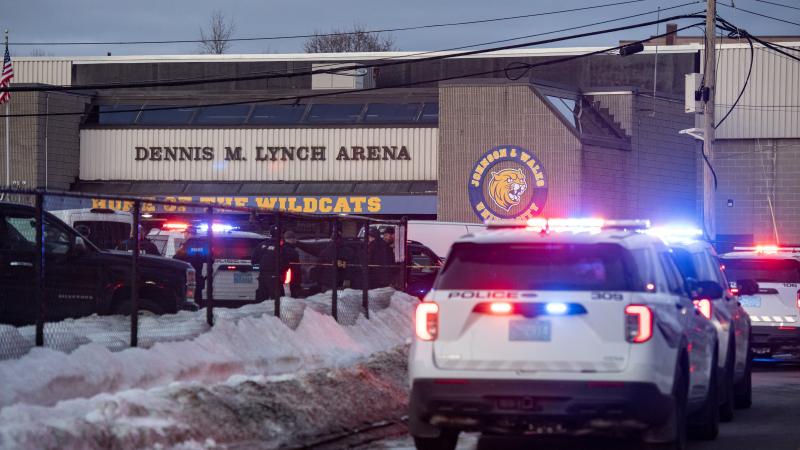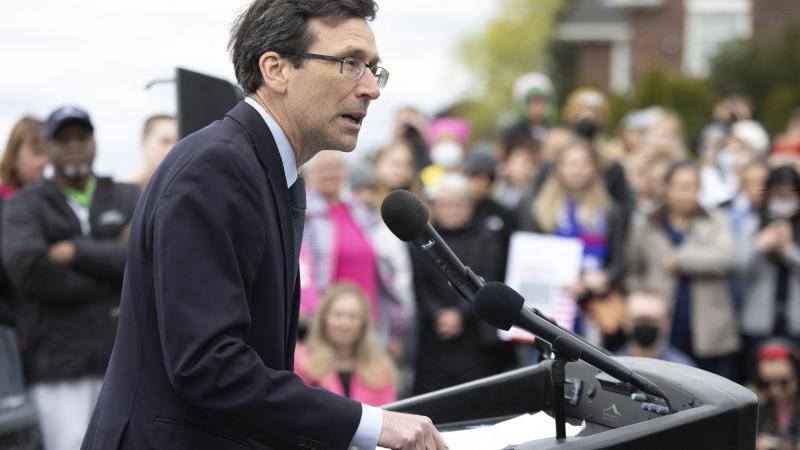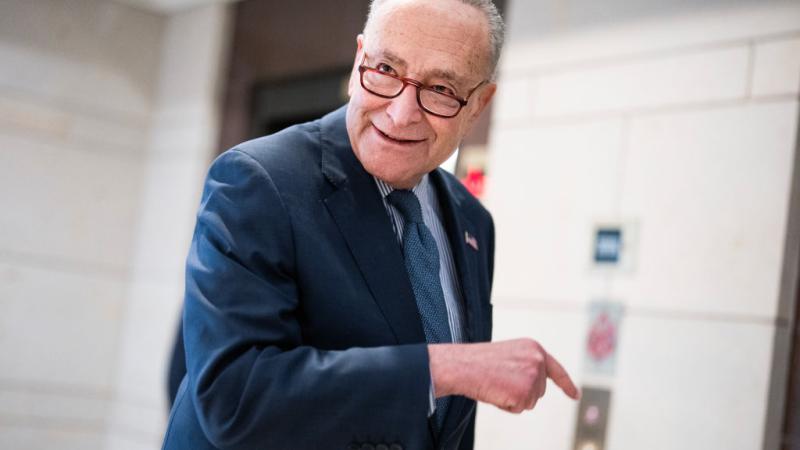Not our friend: Iran keeps attacking U.S. even as Biden tries to lure Tehran into nuclear deal
From alleged murder plots on U.S. soil to arming the Russians in Ukraine, the Iranian regime has escalated its aggression.
As the Biden administration made clear it remained committed to negotiating a new nuclear deal with Iran, foreign military and intelligence officials concluded Russia was using Iranian-supplied drones to wage its war in Ukraine.
Then several U.S. and foreign government agencies issued an advisory warning of the cyber threat posed by Iran to a range of targets, including American police departments and transportation systems.
This juxtaposition of the Biden administration pursuing diplomacy that would provide Iran with a cash windfall while the U.S. government repeatedly finds Iran complicit in a wide range of aggression abroad has come to represent a familiar and consistent pattern throughout the U.S.-Iran nuclear talks: the former pushing for a nuclear deal as the latter lashes out — often against Americans.
State Department spokesman Ned Price on Tuesday reaffirmed the administration's commitment to reaching a nuclear deal with Iran.
"Our bottom line contention is this: It is not too late to conclude a deal," Price told reporters. "And as we've consistently said, as long as we believe that a mutual return to compliance with the JCPOA would be in America's national security interest, that is a diplomatic objective we will continue to pursue."
The 2015 nuclear deal negotiated by the Obama administration placed temporary curbs on Iran's nuclear program in exchange for providing Iran with large-scale sanctions relief. Former President Donald Trump withdrew the U.S. from the deal — officially called the Joint Comprehensive Plan of Action, or JCPOA — in 2018.
President Joe Biden has said reviving it is a top priority, although Just the News has reported on experts warning the current deal being negotiated is an entirely different arrangement than what was finalized under former President Obama, containing more U.S. concessions and serving Iran's interests in dangerous and enduring ways.
In his comments, Price added that Iran's "malign" activities and behavior show precisely why trying to revive the nuclear deal is necessary.
"Every single challenge we face from Iran's ballistic missile program, to its support for proxies and terrorist groups, to its support for Russia in this case, to its malicious cyber programs — every single one of those challenges becomes all the more difficult if Iran has the perceived impunity that would come with a nuclear weapon," said Price. "That's why President Biden is committed that Iran will never obtain a nuclear weapon. We continue to believe that a mutual return to compliance with the JCPOA is the most effective means by which to achieve that."
Price alluded to the fact that on the same day as his remarks, Ukraine's military said it encountered an Iranian-supplied suicide drone used by Russia on the battlefield. U.S. intelligence had warned earlier this summer that Iran planned to send hundreds of drones to Russia to aid its war effort in Ukraine.
British intelligence has also assessed that Russia for the first time this week deployed Iranian-made drones in Ukraine.
The day after Price's remarks, the FBI, NSA, Treasury Department, U.S. Cyber Command, Cybersecurity and Infrastructure Security Agency, and British, Canadian, and Australian governments released a joint advisory warning of "malicious cyber activity" by actors affiliated with Iran's government — specifically the Islamic Revolutionary Guard Corps (IRGC), an official Iranian state military force and a U.S.-designated terrorist organization.
According to the advisory, victims of IRGC-affiliated hacking include a U.S. police department and an American regional transportation system, among several others.
In June, the FBI revealed that last year Iranian-backed hackers launched a cyber attack designed to disrupt services to sick patients at Boston Children's Hospital. FBI Director Christopher Wray called the incident "one of the most despicable cyber attacks I have ever seen."
The advisory came on the same day that the Treasury Department sanctioned 10 individuals and two entities affiliated with the IRGC for their roles in conducting "malicious cyber activity" and the Justice Department indicted three Iranian nationals for cyber attacks against several targets inside the U.S., including multiple power companies and a New Jersey township.
The indictment does not allege those charged in the attacks were acting on behalf of the Iranian government. However, Assistant Attorney General Matthew Olsen of the Justice Department's National Security Division said in a statement that the Iranian government "fails to follow international norms" and "has created a safe haven where cyber criminals acting for personal gain flourish and defendants like these are able to hack and extort victims, including critical infrastructure providers."
Last week, the U.S. blamed and imposed sanctions on Iran for a series of cyber attacks against the government of Albania, a NATO ally, which cut off diplomatic ties with Tehran.
The Iranian government has also allegedly been behind a wave of attempted assassinations against American citizens on U.S. soil.
The Justice Department recently charged a member of the IRGC with plotting to murder former White House National Security Advisor John Bolton.
Former Secretary of State Mike Pompeo was also reportedly the target of the assassination plot.
Both Bolton and Pompeo served in the Trump administration.
The announcement about Bolton came as a man was indicted in a separate case on charges he was armed with a loaded AK-47 and tried to enter the Brooklyn home of journalist Masih Alinejad, a U.S. citizen and outspoken Iranian dissident. Last July, the Justice Department announced charges against Iranian intelligence agents for plotting to kidnap Alinejad and forcibly return her to Iran.
At the same time, author Salman Rushdie, a U.S. citizen whom the Iranian government had for years sought to kill over writings it deemed blasphemous, was stabbed multiple times before a speech in Chautauqua, N.Y. A New Jersey man with an image of Iran's supreme leader, Ayatollah Ali Khamenei, as the avatar on his email account was accused of attacking Rushdie. He pleaded not guilty to second-degree attempted murder and second-degree assault after a grand jury indicted him.
Iran has denied involvement in attempts to harm or kill those allegedly targeted, including former U.S. officials.
This year, the Iranian regime was also linked to an Aug. 21 bomb plot against Iranian pop singer Ebrahim Hamedi in Sweden and alleged plots to kill Israeli tourists and businesspeople in Istanbul in June.
Since Biden entered office, the U.S. has also blamed Iran-backed proxy forces for targeting U.S. forces in Iraq and Syria and U.S. allies in Saudi Arabi and the United Arab Emirates
And last November, the Justice Department charged Iranian hackers for interfering in the 2020 presidential election.
Throughout these incidents, the Biden administration has remained steadfast in its commitment to the nuclear deal, arguing Iran's malign activities prove the merits of the controversial accord.
According to a Foundation for Defense of Democracies analysis, the new deal would give Iran access to $274 billion in its first year and at least $1 trillion by 2030.
Experts have expressed concern that Iran will use the increased funds to further its aggression abroad.
"We still have a pretty radical regime there that is determined to destabilize the region, to attack its neighbors, to promote terrorism," former CIA analyst and senior National Security Council official Fred Fleitz told the John Solomon Reports podcast this week. "And if it's given, huge amouts of sanctions relief ... I'm very worried about what Iran will do with this money to buy missiles, to sponsor terrorism, to send troops. After the 2015 nuclear deal, they sent troops into Syria. I don't know what will happen. I'm worried."
Fleitz added that he doesn’t expect a nuclear deal to be finalized before the midterm elections.
"I think that's something that the Biden administration just doesn't want — the blowback of a big sellout before November."














